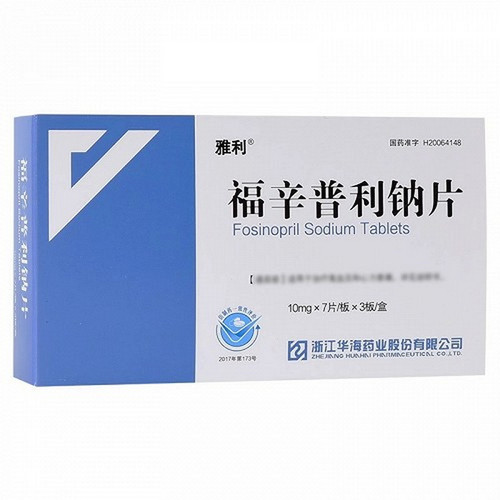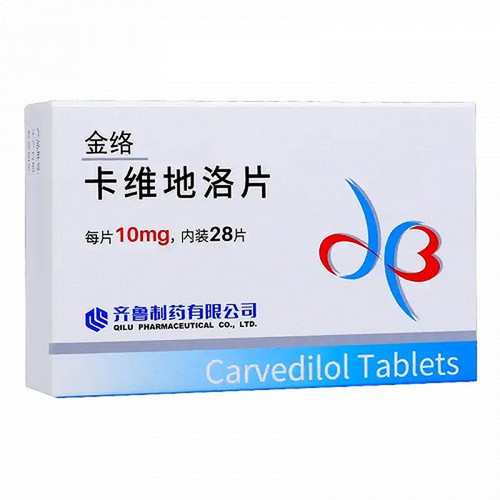Product Overview
[Drug Name]
Generic Name: Lisinopril Tablets
Trade Name: NuoPuLi Lisinopril Tablets 10mg*28 Tablets
Pinyin Full Code: NuoPuLi LaiNuoPuLiPian 10mg*28 Tablets
[Main Ingredient]
The active ingredient of this product is lisinopril.
[Properties]
This product is a white or off-white tablet.
[Indications/Main Functions]
Hypertension: This product is used to treat essential hypertension and renovascular hypertension. It can be taken alone or in combination with other antihypertensive drugs. Congestive Heart Failure: This product can be used in combination with digitalis or diuretics as an adjunctive treatment for congestive heart failure. Acute Myocardial Infarction: This product is used to treat patients with hemodynamic stability within 24 hours after an acute myocardial infarction.
[Specifications]
10mg*28tablets
[Dosage and Administration]
This product should be taken orally once daily. As with other medications that require a once-daily dose, this product should be taken at approximately the same time each day. Absorption of this product is not affected by food. The dose should be adjusted individually based on the patient's condition and blood pressure response (see [Precautions]).
[Adverse Reactions]
General and application site reactions are uncommon: fatigue, asthenia. Laboratory Findings: Uncommon: elevated blood urea enzymes, elevated serum creatinine, elevated liver enzymes, hyperkalemia. A symptom complex has been reported, including one or more of the following: fever, vasculitis, myalgia, arthralgia/arthritis, positive ANA, elevated erythrocyte sedimentation rate, eosinophilia, and leukocytosis. Rash, photosensitivity, or other dermatologic reactions may also occur. Rare: elevated serum bilirubin, hyponatremia.
[Contraindications]
This product is contraindicated in patients with hypersensitivity to any component, in patients with a history of angioedema caused by ACE inhibitors, or in patients with hereditary or idiopathic angioedema. See package insert for details.
[Drug Interactions]
Diuretics: Concomitant use of a diuretic in patients receiving this product often increases its antihypertensive effect. Patients currently taking, especially those recently taking, diuretics may occasionally experience an excessive decrease in blood pressure when taking this drug. Discontinuing diuretics before starting this drug can reduce the likelihood of symptomatic hypotension (see [Precautions 1] and [Dosage and Administration]).
[Precautions]
1. Patients taking diuretics or those with heart failure, dehydration, or sodium depletion are extremely sensitive to this drug and should start with a low dose to avoid hypotension. 2. Patients with renal failure should reduce the dose or extend the duration of administration.
3. During treatment with this drug, white blood cell counts and urine routine tests should be performed regularly. For patients with renal impairment, serum potassium, blood urea nitrogen, and creatinine should be measured. 4. This drug must be used under the guidance of a physician. A dry cough is often the primary reason for not taking this drug. See the package insert for details.
[Pediatric Use]
The safety and efficacy of this drug have not been established in children, so its use in children is not recommended.
[Elderly Use]
Please refer to the [Dosage and Administration] section. See the package insert for details.
[Overdose]
Symptoms of drug overdose may include severe hypotension, electrolyte imbalance, and renal failure. Patients should be closely monitored after an overdose. Treatment should be selected based on the nature and severity of symptoms. Measures to inhibit absorption and accelerate excretion should be employed. If severe hypotension develops, the patient may be in shock and should be rapidly administered intravenous saline. Angiotensin therapy may be considered if possible. ACE inhibitors can be removed by hemodialysis. High-flux polyacrylonitrile dialysis membranes should be avoided. Serum electrolytes and creatinine should be monitored frequently.
[Pharmacology and Toxicology]
Lisinopril is a peptide dipeptidase inhibitor. It inhibits angiotensin-converting enzyme (ACE), which catalyzes the conversion of angiotensin I to the vasoconstrictor peptide, angiotensin I. Angiotensin I stimulates the adrenal cortex to secrete aldosterone. ACE inhibition reduces angiotensin concentrations, thereby reducing the pressor effect and aldosterone secretion. This reduction in aldosterone leads to an increase in serum potassium. Lisinopril primarily lowers blood pressure by inhibiting the renin-angiotensin-aldosterone system. It also has antihypertensive effects in patients with low-renin hypertension. ACE and kininase are the same enzymes that degrade bradykinin. However, whether increased blood levels of bradykinin (a vasodilator peptide) are related to lisinopril's antihypertensive effect remains to be elucidated.








